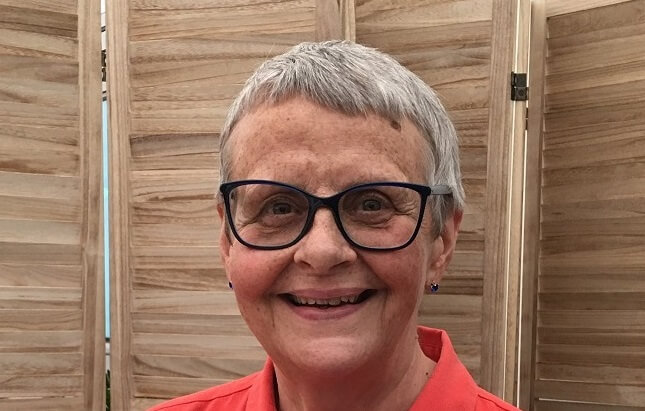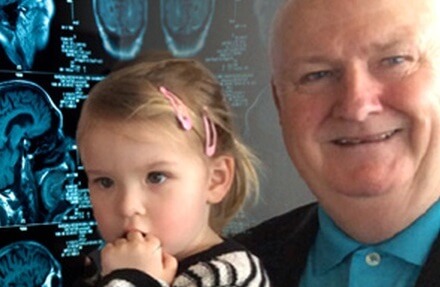
Page contents
- Wendy Mitchell on being diagnosed with dementia
- What is young onset dementia?
- Wendy Mitchell: ‘I was so shocked at the lack of awareness’
- Wendy Mitchell talks about dementia myths
- Her daughter’s cat Billy kept getting fatter and fatter
- 'I even see the positives in a bummer of a diagnosis'
- Peer support from others with dementia has been beneficial
- Losing memories is like losing precious possessions
Page contents
- Wendy Mitchell on being diagnosed with dementia
- What is young onset dementia?
- Wendy Mitchell: ‘I was so shocked at the lack of awareness’
- Wendy Mitchell talks about dementia myths
- Her daughter’s cat Billy kept getting fatter and fatter
- 'I even see the positives in a bummer of a diagnosis'
- Peer support from others with dementia has been beneficial
- Losing memories is like losing precious possessions
Wendy Mitchell on being diagnosed with dementia
Wendy Mitchell’s greatest fear, after being diagnosed with young onset dementia at the age of 58, “was not knowing who my daughters are”.
Up to her death at the age of 68 on 22 February 2024, she was living independently at home in East Yorkshire, supported by her daughters.
This indefatigable woman was an ambassador for the Alzheimer’s Society, received doctorates from Bradford University and Hull University and regularly travelled to conferences and events giving talks on dementia. She wrote a bestselling memoir about her experiences called Somebody I Used to Know. More recently she wrote What I Wish People Knew About Dementia: From Someone Who Knows.
Her third book, One Last Thing — How To Live With The End In Mind, was published on 29 February.
She died in February after refusing to eat and drink. On her blog, Which Me Am I Today, she wrote: “If you’re reading this, it means this has probably been posted by my daughters as I’ve sadly died.”
“In the end I died simply by deciding not to eat or drink any more.
“The last cuppa tea … my final hug in a mug, the hardest thing to let go of, much harder than the food I never craved.
“I wasn’t depressed, I wasn’t forced or cajoled in any way whatsoever, it was solely down to my choice. I was ready. You may or may not agree with what I’ve done, how and when I’ve chosen to leave this world, but the decision was totally mine.”
She had been campaigning for assisted dying to be made legal in the UK and had wanted to go to Dignitas in Switzerland but she fell and broke both wrists and damaged her neck.
What is young onset dementia?
- Dementia is described as early onset or young onset when the person displays symptoms before the age of 65.
- Over five per cent of people living with dementia have symptoms before the age of 65.
- Around 70,800 people living with dementia in the UK are under 65.
- Seven to 12 per cent of cases of early onset dementia are due to a mutated gene.
Wendy Mitchell: ‘I was so shocked at the lack of awareness’
Wendy Mitchell was given a “sad look” by the doctor who diagnosed her with young onset dementia at the age of 58, leading her to believe her life as she knew it was over.
She said: “Post diagnosis, I was so shocked by the lack of awareness, both in the community and the clinical world, that I now spend all my time travelling around the country raising awareness, encouraging others to speak out in order to reduce the stigma associated with dementia and to share my passion for research.”
In carehome.co.uk’s Let’s Talk About Care podcast she revealed the battles she went through on a daily basis and how she had always been a “glass half full person” which helped her through difficult days.
She told carehome.co.uk, her “biggest fear was not knowing who my daughters are. I don’t know, it may be tomorrow so I focus on the present and enjoy the now.
“The biggest thing, me and my daughters have learnt through having dementia, is the power of talking.
“I am still a mum and I want to know what is worrying them as much as they want to know what is worrying me,” she said. Doctors should say ‘there’s still so much you can do’.
Doctors should be saying ‘there is still so much you can do’
She did her utmost to change the attitudes of clinicians and doctors, saying: “When I was diagnosed with dementia, I knew very little about it and I was given that sad look and I thought there was little I could do. When I got this diagnosis my daughters thought the same.”
It is for this reason, she warned: “Language must never be underestimated. The language you use when giving a diagnosis can make or break people. Clinicians should be saying there is still so much you can do. I thought I worked in the ideal place to be diagnosed as I worked in the NHS for 20 years.
“I have found that many of my friends who have dementia gave up their jobs without even telling their employers because of the stigma.”
Wendy Mitchell talks about dementia myths
Her impetus for speaking out about her experiences was to try and bust some of the myths about dementia.
“People assumed because I had been diagnosed with dementia, I had immediately jumped to the late stage of dementia. Dementia is such a vast spectrum. Some days I have bad brain fog but I know if today is bad then tomorrow will be better.
“But I felt there was still so much laughing left to do. I call all this my suduko as it keeps my brain active being in lots of different environments and meeting lots of different people.”
Interestingly, Wendy also revealed how young onset dementia even changed her personality, saying “I used to be very quiet. Now I have become a gregarious alien, according to my daughter”.
Wendy found her emotions changed and she was no longer capable of getting angry or jealous.
“I have now only three states,” she said, “happy, sad and content”.
Her daughter’s cat Billy kept getting fatter and fatter
In her book, Somebody I Used to Know, she talked about her daughter’s cat Billy who kept getting fatter and fatter.
‘Billy pads into the kitchen performing a tiny dance in front of my feet before he finds the patch of sunshine on the kitchen tiles. He flops down on it while I scratch the back of his ears while he purrs his approval. I shake some biscuits into his bowl and he gets up and crunches on them noisily. He’s only allowed a few as Gemma has put him on a diet. She’s not sure why he’s put on so much weight recently. Even the vet commented on it.
‘I make myself a cup of tea and as the kettle boils, I feel Billy’s tail curling around my legs . I glance at his empty bowl. “Ah Billy, have I forgotten to feed you ?” He looks up with big, sad eyes, his purr audible over the boiling kettle that switches itself off, and I shake a few more biscuits into his bowl.’
Wendy went to greet her daughter who had just come home from work. ‘Gemma and I catch up on the day. Twenty minutes must pass by like that and then Billy jumps down from my lap and sniffs at his empty bowl and sits, staring at it. “Ah no, I must have forgotten.” Gemma looks at him, unsure.
‘“The vet said Billy has to lose weight; he must be getting fed somewhere else because his diet isn’t working. You are only giving him a few biscuits when you’re on Billy duty, aren’t you mum?”’
‘”‘Oh yes, I’m sure I do,” as I shake more biscuits into his bowl.’
‘I even see the positives in a bummer of a diagnosis’
Wendy’s account was full of humour and she talked about being a “glass half full person” saying: “I am a positive person so I even see the positives in a bummer of a diagnosis”.
Wendy used to work as a manager for the NHS at a hospital in Leeds and revealed “I used to be renowned for having a brilliant memory but it started letting me down badly. I came out of my office and I forgot where I was.
“I had so many different diagnoses at the beginning. They said it was stress or the menopause when I had already had the menopause. I knew it wasn’t stress as I am not that type of person.
“After 18 months of different memory tests, there was a SPECT scan which showed a slowness in my brain.”
She was determined to reduce the stigma around the disease and encouraged others to take part in clinical trials and research.
She said “talking is the most powerful thing you can do to allay people’s fears when you have dementia. Talking is the most powerful thing I and my daughters can do.”
Peer support from others with dementia has been beneficial
Wendy found peer support from other people living with dementia to be hugely beneficial, saying: “We share solutions all the time and we listen to each other. We are non-judgmental. We are all going through the same thing. If one of us forgets who the prime minister is, it really doesn’t matter.”
Wendy found images spoke more to her than words so in her blogs she used a lot of photos. “Photographs make me happy. People never take photos of people in a bad mood. When I feel anxious I go into my memory room which is filled with photographs and I look at them.
“I do travel around the country a lot going to conferences on dementia. But people see me and think it is easy for me.
“But I have a pink file that tells me where I am going and has details on everything. It also has a plan B as trains don’t always go right. My Twitter friends are amazing. They will tell me what train to get if my train is cancelled.”
Wendy admitted that: “When I walk out of here today I will forget the details. But I will remember the emotions.”
Losing memories is like losing precious possessions
“Every day I lose a memory. For me when I lose memories every day, it is like losing my precious possessions every day.”
Wendy wrote a blog Which Me Am I Today as she said: “It will hopefully convey the helplessness of those diagnosed with dementia, as there is no cure – the end is inevitable.
“However, I’m also hoping I can convey that, although we’ve been diagnosed, people like me still have a substantial contribution to make. We still have a sense of humour. We still have feelings. I’m hoping to show the reality of trying to cope on a day-to-day basis with the ever-changing environment that dementia throws at those diagnosed with the condition. Living as well as you can with dementia is all about adapting. Adapting to new ways to enable us to live better for longer with dementia.
“I can type as though dementia never entered my world as that part of my brain has not yet been affected. But that often works against me as people question my diagnosis. All I can say is, live a day in my shoes and I’m sure the reality will dawn.
“What I want is not sympathy. What I want is simply to raise awareness.”
To read Wendy Mitchell’s blog click here. Her tweets are still available to read at @WendyPMitchell


